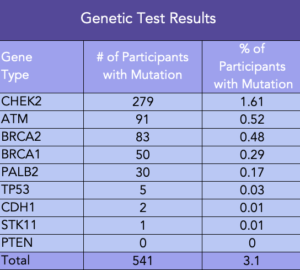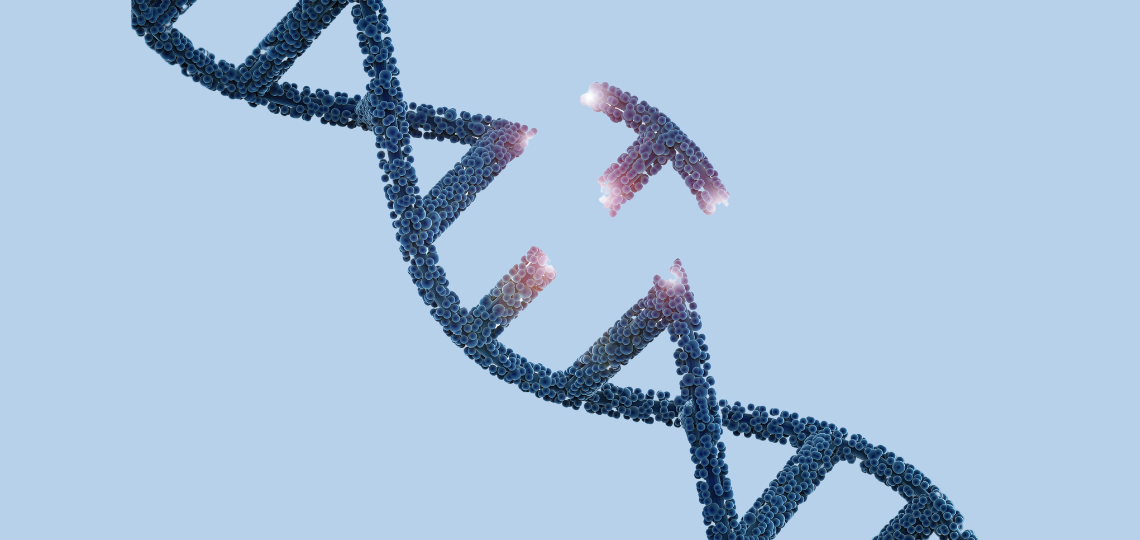Since the WISDOM Study’s launch in 2016, we’ve enrolled over 60,000 women across the United States. And for the past 7 years, our community of participants, partners and scientists have eagerly awaited initial findings from our investigation into personalized, risk-based screening for breast cancer.
In late 2022, WISDOM’s genetic counselors presented initial findings at the National Society of Genetic Counselors (NSGC) Annual Conference, and we’re now able to make our earliest findings related to genetics and breast cancer available to you!
Here are the highlights from our initial analysis of germline (i.e. hereditary genes) and family history findings from participants in the “Personalized Group” of the study:
- 17,377 participants in the “Personalized Group” completed a saliva-based at-home genetic test kit (also referred to as next- generation sequencing and deletion/duplication analysis of the following genes associated with risk for breast cancer: ATM, BRCA1, BRCA2, CDH1, CHEK2, PALB2, PTEN, STK11, TP53).
- These participants also completed a baseline questionnaire that included self-reported family history of cancer, race/ethnicity, and personal and family genetic testing history.
- Of the 17,377 participants who completed the genetic test, 541 (3.1%) individuals had at least 1 pathogenic or likely pathogenic variant (also referred to as genetic mutation) identified. (see the table below showing the number of participants who discovered certain mutations).
- Of those 541 individuals who had genetic mutations, 14.8% were previously known and reported by the participant. The remainder of people with mutations were not previously aware of the mutation(s).
- The majority of mutations were identified in CHEK2 (1.61%), ATM (0.52%), and BRCA2 (0.48%).
- And perhaps the most surprising finding – a substantial proportion of mutation carriers reported no family history of breast cancer in first or second-degree relatives (24%-46%).
- Of mutation carriers, 33% reported a first-degree relative (mother, sister, or daughter) with breast cancer, compared to 27% in those with a negative test result (i.e. people who did not have genetic mutations).

To view the entire poster with additional results, click here.
So what does this all mean?
There are several ways to interpret these initial findings, but perhaps most importantly we should take note of the fact that out of 17,377 people tested for genetic mutations, only 3.1% had any (in other words, genetic mutations remain somewhat rare). And, having a genetic mutation does NOT mean you will get a cancer, rather, it places you at increased risk for developing cancer over your lifetime, and should be considered a risk factor alongside other risk factors (like lifestyle, diet, environmental exposure, breast density, reproductive history, etc- some of which we have control over).
Another notable finding is that mutation carriers reported a close relative with breast cancer at similar rates to non-mutation carriers. Which means it’s possible to have a genetic mutation without having a close family member with cancer, and vice versa. This has implications for knowing whom to offer genetic tests to in the clinical setting- in current medical practice, healthcare providers may recommend a genetic test only if you have a close degree relative with a history of an aggressive cancer. These findings suggest that it may be time to develop new strategies and guidelines around genetic testing for breast cancer risk in the general population, and, it’s imperative for scientists to conduct more research and for people to continue to participate in trials.
For more information on genetic risk for cancers we encourage you to visit these websites, and/or speak with your healthcare provider.
- FORCE- Facing Hereditary Cancer Empowered: https://www.facingourrisk.org/
- American Cancer Society- Genetic Testing for Cancer Risk: https://www.cancer.org/healthy/cancer-causes/genetics/genetic-testing-for-cancer-risk/understanding-genetic-testing-for-cancer.html
Poster citation:
2022. Germline Findings in Breast Cancer Genes: Initial Results from the WISDOM Study. [Poster] National Society of Genetic Counselors 41st Annual Conference, 11/2022, Nashville, TN. Barry Tong MS MPH CGC (UCSF), Lisa Madlensky PhD CGC (UCSD), Rita Ryu MBA MPH (UCSF), Tomiyuri Lewis (UCSF), Rashna Soonavala (UCSF), Patricia Choy (UCSF), on behalf of the Wisdom Study and Athena Breast Health Network Investigators and Advocate Partners and Laura Esserman MD MBA (UCSF, WISDOM PI).



